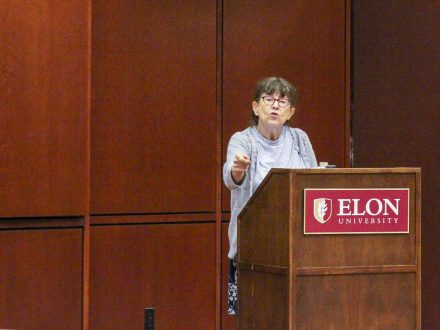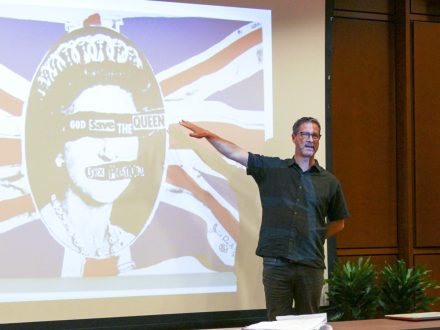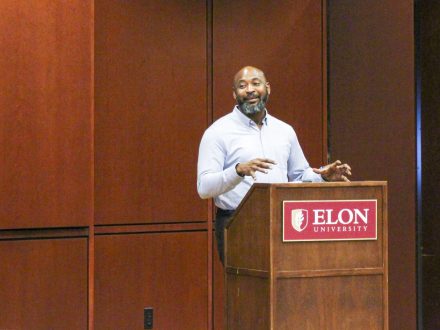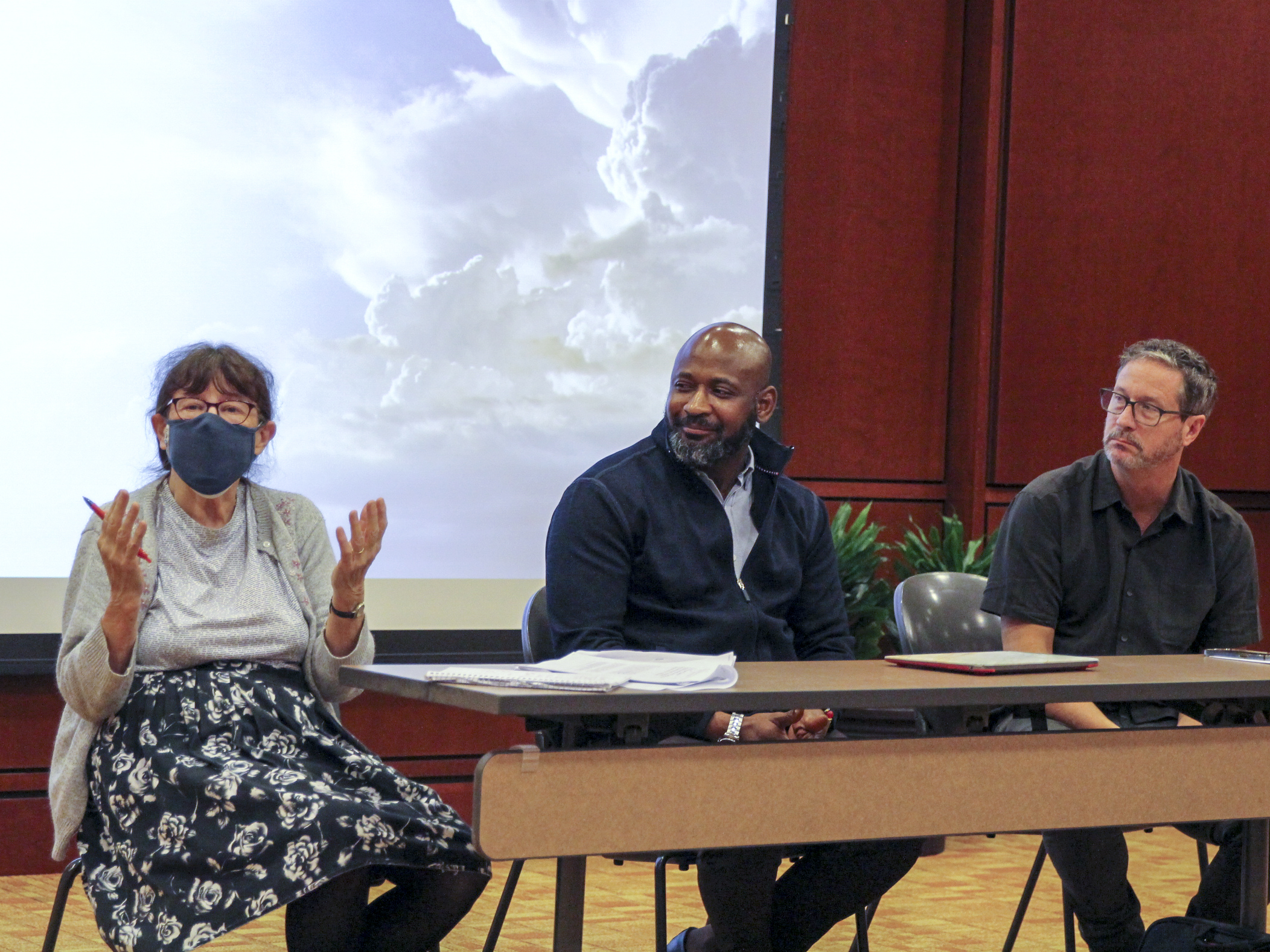Professors in the Departments of History & Geography and English met in LaRose Digital Theater to reflect on the Queen’s life, global politics and the possible futures ahead for the monarchy, Commonwealth and former British colonies.
Three professors spoke about the history and possible future of the British monarchy in the context of Queen Elizabeth II’s 70-year reign during a panel discussion Monday, Oct. 3 in Koury Business Center’s LaRose Digital Theater.
Professor of History Michael Carignan, Professor of English Rosemary Haskell and Assistant Professor of History Waseem Kasim examined various aspects of the Queen’s influence in the United Kingdom and globally in an era when the British empire shrank as nations declared independence or were decolonized as part of the Commonwealth. They discussed the monarchy’s role in government, the Queen’s sense of duty and wielding of soft power, and the British empire’s history of colonization, violent oppression and exploitation.

“On Thursday, Sept. 8, news spread all over the globe that Queen Elizabeth passed away. That started conversations among faculty about a moment of importance not just for England but for people all over the world,” said moderator Andrea Sinn, associate professor of history.
Haskell, who was born in England and emigrated to the U.S. for post-graduate studies, juxtaposed ideas of Queen Elizabeth II being omnipresent but of little consequence to British life — “like wallpaper” — to that of a stabilizing political force in tumultuous times and, as head of the Church of England, a religious comfort, as well.
“She saw 70 years of ups and downs,” Haskell said, referencing strife in Northern Ireland, socialist political movements and the coal miners’ strike in the ’80s. “Under her reign, the United Kingdom became much less white, more multi-cultural, less Christian, more Muslim, more Hindu and less officially religious. She met regularly with prime ministers … and it was helpful for the nation to think that she could enlighten and strengthen a politician’s world view.”
Haskell recently reflected on the Queen’s passing in a column, “The Queen’s gift to her people? Modeling the nation’s best self,” distributed by the Elon University Writer’s Syndicate.

Carignan pointed to the anti-establishment, anti-monarchical sentiments expressed in the punk and British indie-rock scenes in the 1970s and ’80s, specifically the Sex Pistols’ “God Save the Queen” and The Smiths’ “The Queen is Dead.” Carignan studies modern European and British history, as well as its cultural and intellectual movements.
“The monarchy was an institution that a generation felt in conflict with, including its legacy as an institution that stood for a rapacious empire that enriched itself on slave labor for hundreds of years,” Carignan said.
Kasim dug into that history and legacy of British colonialism and its continued effects on now-independent states around the world.
“The British became a multicultural and multifaith society under Queen Elizabeth, but the moment she was crowned, she accepted the baggage that came with the monarch,” Kasim said. “There is a false narrative that the monarchy and Britain was the most powerful spreader of democracy and Christianity around the world. It was the opposite. It was a very powerful institution that was violent and exploitative. It perfected the practice of enslavement, pillage, murder and kidnapping not only in Africa but in Asia and the Americas.”
The three wondered together about how the monarchy and government of the United Kingdom might begin to right those wrongs moving forward through financial or other means.

They also discussed the Queen’s personality and how her lengthy rule shaped public perceptions of the monarchy. Haskell spoke of general “affection for the idea of the Queen.” Carignan, whose mother is Canadian but has lived in the U.S. for decades tuned into coverage of the death and funeral “because she was my queen,” he said.
Carignan addressed the nadir of the queen’s popularity in the 1990s — after her children’s arranged marriages dissolved and former Princess Diana died in a 1997 car crash — a time when Elizabeth II’s reticence toward public statements damaged her esteem. When she did finally acknowledge the national mourning, “it was a turning point in her reputation because she did what the people wanted her to do, which was acknowledge that Diana was a national treasure of some kind.”
They also wondered what kind of leader King Charles III would be, and what kind of Britain he would rule. There are hints that he may reveal more inner workings of the monarchy than previous monarchs, that he may be more vocal in political matters, and more willing to accept and make amends for the empire’s past, they said.
“Throughout history, the moment when the monarch dies is a time of danger,” Haskell said. “Even today, it is a moment of possibility and danger. This could be a time of dissolution if Ireland, Scotland and others declare independence and break away from the kingdom.”
The event was sponsored by Department of History and Geography and the International and Global Studies Program.



